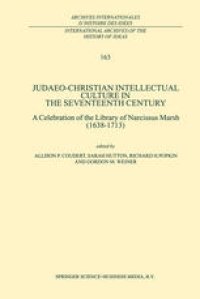
Ebook: Judaeo-Christian Intellectual Culture in the Seventeenth Century: A Celebration of the Library of Narcissus Marsh (1638–1713)
Author: Richard H. Popkin (auth.) Allison P. Coudert Sarah Hutton Richard H. Popkin Gordon M. Weiner (eds.)
- Tags: History, Epistemology, Philosophy, Cultural Heritage
- Series: Archives Internationales D’Histoire des Idées / International Archives of the History of Ideas 163
- Year: 1999
- Publisher: Springer Netherlands
- Edition: 1
- Language: English
- pdf
MURIEL MCCARTHY This volume originated from a seminar organised by Richard H. Popkin in Marsh's Library on July 7-8, 1994. It was one of the most stimulating events held in the Library in recent years. Although we have hosted many special seminars on such subjects as rare books, the Huguenots, and Irish church history, this was the first time that a seminar was held which was specifically related to the books in our own collection. It seems surprising that this type of seminar has never been held before although the reason is obvious. Since there is no printed catalogue of the Library scholars are not aware of its contents. In fact the collection of books by late seventeenth and early eighteenth century European authors on, for example, such subjects as biblical criticism, political and religious controversy, is one of the richest parts of the Library's collections. Some years ago we were informed that of the 25,000 books in Marsh's at least 5,000 English books or books printed in England were printed between 1640 and 1700.
This work focuses on Latin Judaica and Biblical interpretation with a primary emphasis on texts that were found in the library of Archbishop Narcissus Marsh of Dublin. This remarkable collection of Latin Judaica, Polyglot Bibles, and other works sheds light on the way in which the Protestant Reformation dealt both with Jews, and the Bible, the Jewish Kabbalah and religious toleration or intolerance. The articles contained herein will be of especial interest to historians of religion and philosophy, and those dealing with Jewish-Christian relations and the manner in which Biblical interpretation was changed as a result of seventeenth-century influences.
The articles also weave a new approach to the broad history of religious toleration. Philosophers, political thinkers, religious clerics, and budding anthropologists look at Judaism, Christianity, Kabbalah, and the Bible under a new and vastly more modern lens.